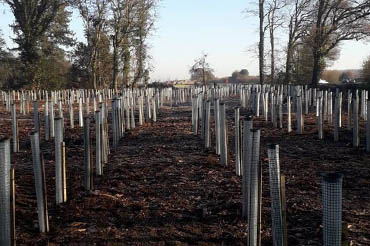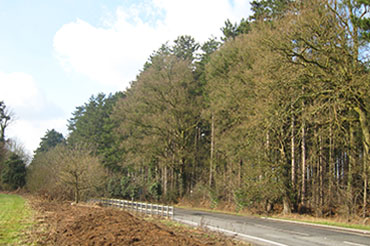Latest news
All the Corsican pine have been removed from the Big Wood and 3,200 native broadleaved tree saplings have been planted.

Hedge laying works have been completed along Peacock Lane where a new boundary fence is now installed.
New entrance gates, signs, waymarkers and a surfaced path provide better access to the woodland for residents. Wildlife are benefitting from new homes such as bird and bat boxes.
There is a new seating area at the site entrance and new interpretation is proposed.
We are continuing to carry out wildlife habitat maintenance and improvements. This includes managing invasive species, such as bracken, to prevent it from becoming too dominant in the woodland.
The project
The Big Wood regeneration project removed Corsican pine trees from a woodland in Bracknell. We replaced the pine trees with native tree types. This change made a better home for wildlife and a more enjoyable place for recreation. The new trees will also give us a sustainable source of timber. This is part of a wider aim to regenerate council managed coniferous forestry plantations throughout the borough.
To find out more see our tree strategy.
Location
The Corsican pine were removed from a broadleaved woodland located to the north of Peacock Lane (in a north to south direction between Peacock Lane and Berkshire Way).
Reason for the scheme
A public consultation of residents indicated concerns about the sustainability of local forestry plantations. These pine plantations were planted widely before the development of Bracknell town and have since come into the ownership of the council.

The pine trees in this location had been planted as a commercial plantation over 50 years ago. Pines will naturally deteriorate over time, as they cannot be effectively pruned to improve their stability or extend their age in a safe condition. Retaining these trees was therefore not a sustainable option.
We recognise the value of woodland in the borough and the importance of preserving this important resource, which is why we are undertaking work to replace the felled trees with broadleaved varieties.
A mix of broadleaved species will be more:
- beneficial to wildlife
- resistant to pest and diseases
- resilient to climate change
Long-term plan
A borough-wide comprehensive forest management plan is underway. We are progressively replacing the existing conifer plantations with broadleaf species. This will maintain existing woodlands while plantations become diverse woodlands of the future.
During this process, which will take decades, we will improve the quality of the woodland. We will achieve this by adding tree species of varying ages and sizes. We will also take measures to control invasive species that compete with the vegetation we want to establish. This will lead to an improved habitat for an increased variety of insects, birds and mammals.